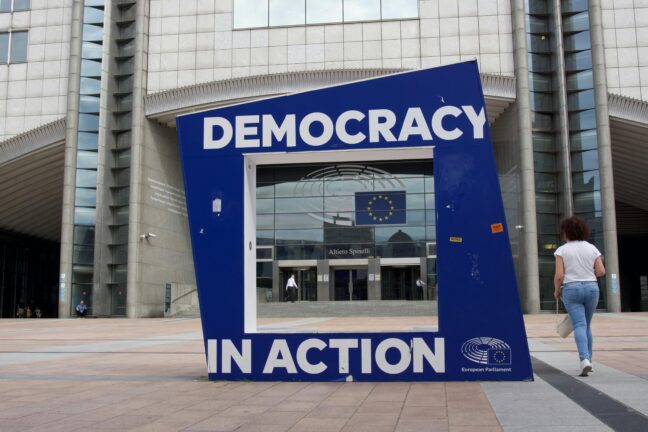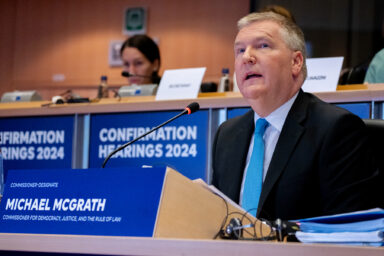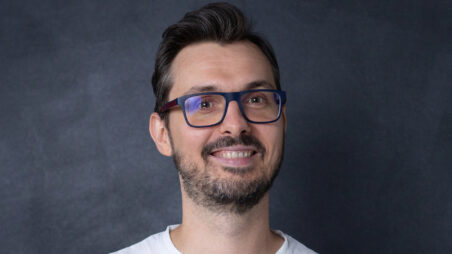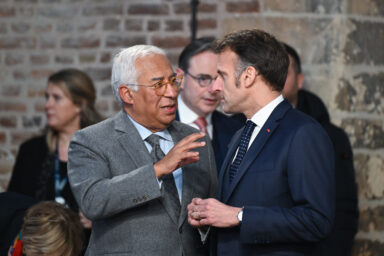The announcement of a European Centre for Democratic Resilience sparked different reactions among Members of the European Parliament. While some lawmakers see it as an important step to shield democracies from disinformation, others fear a new Brussels bureaucracy, or even a political tool to silence different opinions.
The role of civil society became a parliamentary flashpoint once again. “The ‘European Center for Democratic Resilience’ sounds like an Orwellian concept,” MEP Fabrice Leggeri (PfE/FRA) told EU Perspectives on Monday, portraying the initiative as a threat to freedom of thought itself. To him, the project is “the ultimate weaponisation of the so-called rule of law by the European Commission to silence people and to ban real freedom of opinion and real freedom of speech in Europe.”
Where conservatives fear censorship, the Socialists sees a chance to reinforce democracy, provided the new body avoids duplication. “It is essential that this new body does not duplicate the work of existing structures, but instead adds real value,” said Ana Catarina Mendes (S&D/PRT).
An ambitious idea without a blueprint
What is it all about? The Centre received much attention after Commission President Ursula von der Leyen described the new body as an ambitious instrument in the fight against information manipulation in her State of the Union address. “This will bring together all the expertise and capacity across member states and neighbouring countries” to monitor and detect disinformation, she told lawmakers in Strasbourg.
Yet, while the objective of safeguarding democracy is broadly shared, MEPs have contrasting expectations and doubts about the scope of the new institution. And even whether it is needed.
You might be interested
While the structure and competences of the Centre are still undefined, the Commission’s ambition is clear. The goal is to “increase our collective capacity to monitor and detect information manipulation and disinformation and to coordinate response” and “to ensure an online space where reliable, accurate, and impartial information thrives”.
An empty shell?
Ms Mendes welcomed the proposal core, but warned that vagueness undermines credibility. “Further details about the proposal must be clarified,” she said, noting that she has submitted a written question to Commissioner McGrath requesting more information on its scope, budget, and competencies.
For Ms Mendes, the new body must not become an empty shell. It should be tasked with “clear competences in coordination, knowledge-sharing, awareness-raising, and pedagogy campaigns” so it can provide “concrete instruments to support both member states and neighbouring countries in the protection of democracy”.
Such a Centre must be given clear competences in coordination, knowledge-sharing, awareness-raising, and pedagogy campaigns –— MEP Ana Catarina Mendes (S&D/PRT)
On the right, however, there is little enthusiasm for the idea. Conservative MEP Stefano Cavedagna (ECR/ITA) argued that the EU does not need another structure at all. “The task of the Commission must be to promote cooperation among the competent national authorities, not to create new ones,” he said. Besides, Mr Cavedagna warns that the Centre risks becoming “another attempt to set up a bureaucratic and top-down European structure”.
Censorship fears
Lawmakers’ concerns about EU overreach and limits on free expression dominate much of the criticism of the new Centre. For Mr Cavedagna, the initiative could “be used by one political side to censor those governments that do not align with their dictates.”
Also, when it comes to resources, lawmakers diverge on what the Centre should mean in practice. On the left, expectations are high. Ms Mendes argues that a strong budget is essential for results, warning that “we also expect that it will be provided with the necessary budgetary means to ensure it can deliver tangible results.”
The idea of establishing a “European Centre for Democratic Resilience”, represents another attempt to set up a bureaucratic and top-down European structure — MEP Stefano Cavedagna (ECR/ITA)
On the right, however, financial ambition is seen as part of the problem. For Mr Cavedagna, channelling the new structures “increases public costs” without tackling the real challenges. In his view, Europe’s democratic resilience should come from national responsibility and cooperation, not to creation of new authorities.
Civil society cooperation
The role of civil society is another dividing line in the debate over the new centre. While for the socialists, “civil society must be consulted and involved in shaping this new centre”, the Patriots dismissed such cooperation as dangerous. MEP Leggeri warned that the initiative would empower “Soros-funded NGOs and activists to spread their woke ideology and their hatred against our historic national and European identities.”
As for the Commission, it sees civil society and media as essential allies. Alongside the Centre, von der Leyen announced a Media Resilience Programme to support independent journalism and media literacy. She cautioned that the hollowing out of traditional media in some communities across Europe is dangerous for our democracy, allowing disinformation to thrive.
A Commission spokesperson added that the Centre’s main aim will be “to ensure that EU institutions, member states and other stakeholders can cooperate better in the face of common threats to democracy” by increasing collective capacity to monitor and respond to disinformation.
What comes next
The debate reveals how deeply divided the Parliament is over how to defend European democracy. For now, the Commission has promised more details on the scope of the initiative. Until then, the European Centre for Democratic Resilience remains an expected idea. For some, a shield against manipulation; for others, a symbol of EU control.











